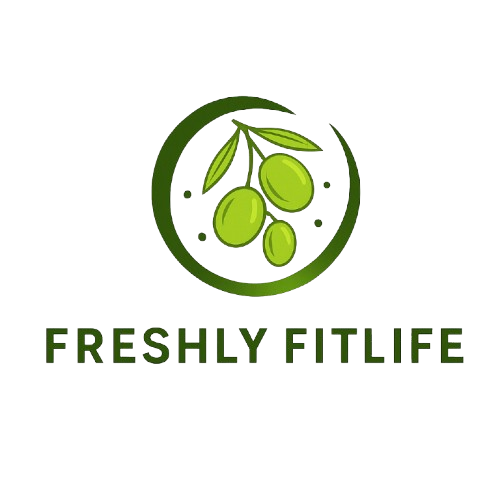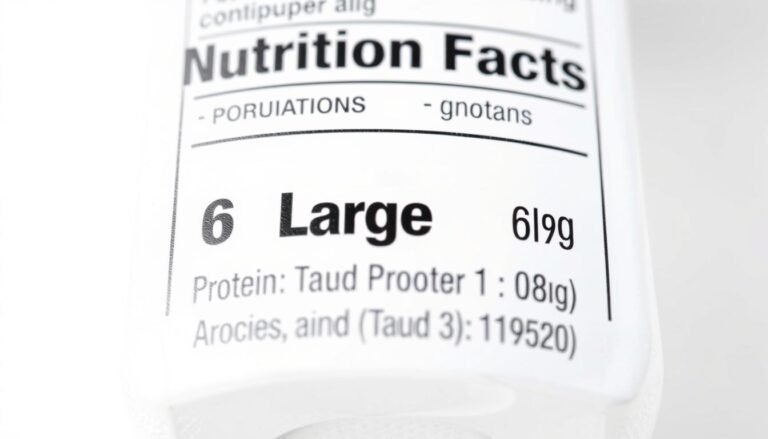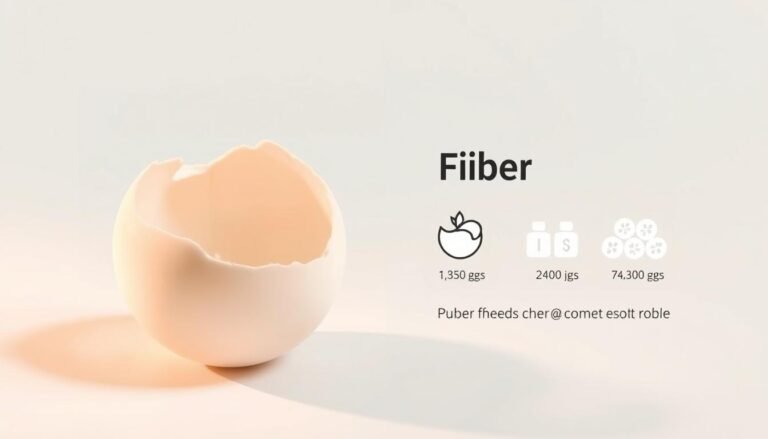What if the most nutritious part of an egg isn’t what you think? While yolks often steal the spotlight, the clear, protein-packed white might be the real hero for health-conscious eaters. Let’s crack into the facts.
Egg whites are a low-calorie powerhouse, offering just 16–19 calories per serving. Compare that to a whole egg’s 70+ calories, and it’s easy to see why fitness fans and dieters favor the yolk-free option. But there’s more to this story than numbers.
Packed with 3–4 grams of protein and zero fat, the humble egg white supports muscle growth and weight management. It’s also cholesterol-free, making it ideal for heart-healthy meal plans. Whether you’re meal-prepping for keto or balancing macros, this versatile ingredient adapts to nearly any diet.
In this guide, you’ll discover:
- Precise calorie counts and nutrient comparisons
- Science-backed benefits of choosing egg whites
- Simple cooking hacks to maximize flavor and texture
We’ve analyzed data from trusted sources like SparkPeople’s nutritional database to give you accurate, actionable insights. Ready to rethink your breakfast routine?
Key Takeaways
- One boiled egg white contains just 16–19 calories
- Provides 3–4 grams of high-quality protein per serving
- Naturally free of cholesterol and saturated fats
- Works perfectly in omelets, salads, and protein snacks
- Rich in B vitamins and minerals like potassium
Understanding the Nutritional Profile of Boiled Eggs
Eggs have long been a breakfast staple, but their nutritional secrets might surprise you. While both parts of an egg offer benefits, their roles in a balanced diet differ dramatically. Let’s examine what makes each component unique.
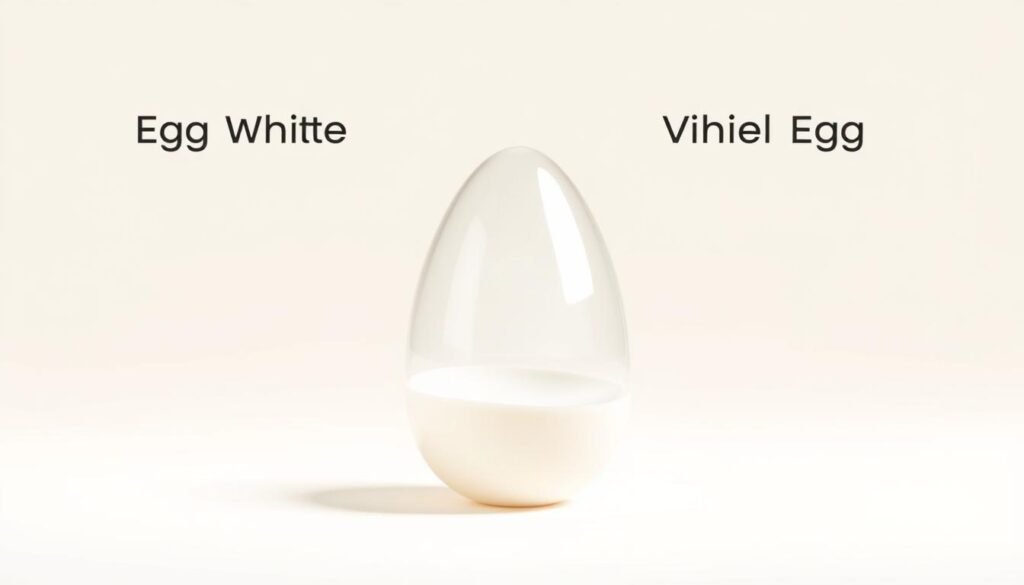
Egg Whites vs. Whole Eggs: A Nutritional Showdown
The clear part of an egg packs a lean punch. A single egg white delivers 3–4 grams of protein with just 18 calories. Compare that to a whole egg’s 74 calories and 6 grams of fat, and the contrast becomes clear.
| Nutrient | Egg White | Whole Egg |
|---|---|---|
| Calories | 18 | 74 |
| Protein | 3.6g | 6.3g |
| Total Fat | 0g | 5g |
| Cholesterol | 0mg | 186mg |
Vitamins and Minerals Breakdown
Yolks contain nearly all of an egg’s vitamin A, B12, and D. They’re also rich in carotenoids that support eye health. Egg whites counter with potassium and magnesium, making them ideal for low-cholesterol diets.
Whole eggs provide more nutrients overall, but that comes with saturated fat. For those watching heart health, whites offer a smart alternative. Balance is key – pairing whites with other vitamin-rich foods creates complete meals.
How Many Calories in a Boiled Egg Without Yolk?
Separating the white from the yolk transforms an egg’s nutritional math. A single boiled white contains just 18 calories – 75% less than a whole egg’s 74 calories. This simple swap removes 5 grams of fat and 186mg cholesterol while keeping 90% of the protein.
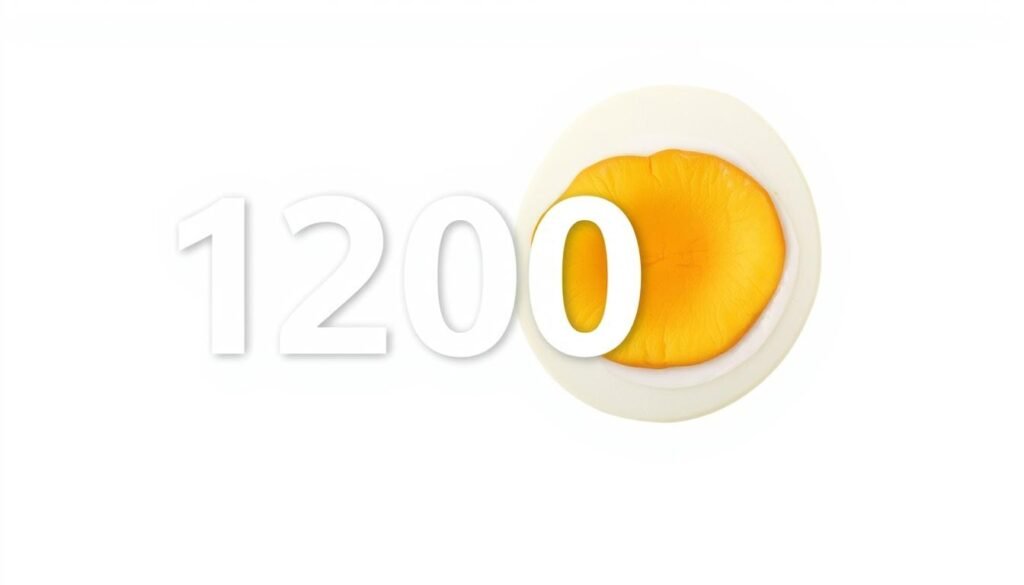
Breaking Down the Numbers
Egg whites are 90% water and 10% pure protein. Each serving delivers 3.6g of complete protein containing all nine essential amino acids. Unlike the yolk, they’re naturally free of saturated fat and dietary cholesterol.
| Component | White (1 large) | Whole Egg |
|---|---|---|
| Energy | 18 calories | 74 calories |
| Protein | 3.6g | 6.3g |
| Total Fat | 0g | 5g |
| Cholesterol | 0mg | 186mg |
Why This Matters for Your Diet
Choosing whites over whole eggs cuts 56 calories per serving. Over a week, that’s 392 calories saved from seven breakfasts – equal to a 45-minute jog. The high water content also promotes fullness, helping curb snack cravings.
While yolks provide valuable nutrients like vitamin D, whites offer a lean base for protein-packed meals. Pair them with avocado or spinach to balance nutrition without excess calories.
Egg Whites: Low Calories and High-Quality Protein
Egg whites might be the ultimate fitness fuel you’re overlooking. Their crystal-clear appearance hides a powerhouse of nutrients that work harder than most protein sources. Let’s explore why they’re a game-changer for active lifestyles.
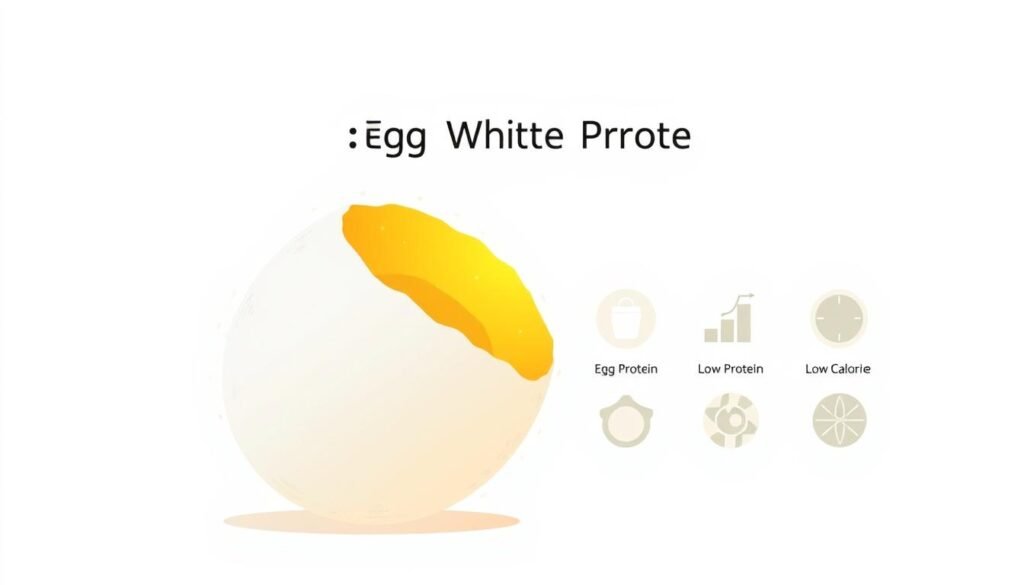
The Complete Amino Acid Profile
Egg whites deliver all nine essential amino acids your body can’t produce. Leucine, isoleucine, and valine – the branched-chain trio – kickstart muscle repair. With 3.6 grams of protein per white, they rival premium supplements without artificial additives.
Unlike plant-based proteins, egg whites are bioavailable. This means your body absorbs nearly 90% of their nutrients efficiently. Pair them with whole grains or veggies for balanced meals that keep energy levels steady.
Benefits for Body Composition and Weight Management
Research shows high-protein diets boost metabolism by up to 15%. Egg whites shine here – their 18-calorie package triggers satiety hormones better than carb-heavy snacks. A Houston Methodist study confirms replacing just one daily meal with egg whites can reduce cholesterol intake by 25%.
- Zero fat content supports lean muscle retention
- Low sodium levels aid in water balance
- Potassium-rich profile counters muscle cramps
For extra benefits, try omega-3 enriched eggs. Their whites retain the same protein punch while offering heart-healthy fats from specially fed hens. Whether scrambled or baked into muffins, these clear wonders adapt to any nutrition plan.
The Role of Cholesterol and Fat in Egg Components
Eggs have a split personality when it comes to nutrition. The golden center and clear outer layer couldn’t be more different in their impact on heart health. Let’s explore what makes these components nutritional opposites.
High Cholesterol in Yolk vs. Zero Cholesterol in Whites
The yolk holds 186mg of cholesterol – 62% of the daily limit. That’s more than a fast-food cheeseburger! Meanwhile, the white contains none. This stark contrast explains why cardiologists often recommend whites for patients managing blood lipid levels.
| Component | Cholesterol | Saturated Fat |
|---|---|---|
| Whole Egg Yolk | 186mg | 1.6g |
| Egg White | 0mg | 0g |
Implications for Heart Health and Saturated Fat Intake
While yolks provide nutrients like choline, their saturated fat content raises LDL (“bad”) cholesterol in sensitive individuals. The American Heart Association notes that “limiting dietary cholesterol benefits those with existing heart conditions”.
For most people, moderate yolk consumption (3-4 weekly) poses little risk. However, those with genetic predispositions or diabetes may need stricter limits. Whites offer a safe alternative, delivering pure protein without impacting cardiovascular markers.
Recent studies reveal a twist: dietary cholesterol affects blood levels less than once thought. But since 30% of people are “hyper-responders,” whites remain a smart choice for uncertainty. Pair them with fiber-rich veggies to create meals that support both muscle growth and arterial health.
Cooking Techniques for Perfectly Boiled Eggs
Mastering egg preparation starts with nailing the basics. Whether you prefer classic stovetop methods or crave kitchen shortcuts, these techniques ensure consistent results every time.
Traditional Boiling and Timing Tips
Fill a pot with enough water to cover your eggs by an inch. Bring to a rolling boil, then gently lower room-temperature eggs using a spoon. Reduce heat to simmer and set your timer:
- 6 minutes: Runny yolk
- 9 minutes: Creamy center
- 12 minutes: Firm throughout
Immediately transfer cooked eggs to an ice bath for 5 minutes. This stops residual heat from overcooking the whites and makes peeling effortless. Add 1 tablespoon salt to the boiling water – it helps prevent cracks without adding calories.
Modern Methods: Air Fryer, Instant Pot, and Microwave Variations
For crispy-edged whites without boiling, try an air fryer. Cook at 250°F for 15 minutes – no preheating needed. Instant Pot fans swear by the 5-5-5 method: 5 minutes high pressure, 5 minutes natural release, 5 minutes ice bath.
Microwave users, proceed with caution! Poke a pin-sized hole in the shell’s rounded end. Submerge in a bowl of hot water, cover with a plate, and microwave 4 minutes at 50% power. Always handle with oven mitts – steam builds quickly.
All methods destroy harmful bacteria when cooked to 160°F. Use a food thermometer for safety, especially with softer yolks. For best texture, choose large eggs (50–60 grams) and avoid overcrowding your cooking vessel.
Health Benefits and Potential Risks When Eating Egg Whites
Egg whites walk a nutritional tightrope between powerhouse benefits and hidden considerations. While they’re celebrated for lean protein, understanding their full impact requires looking beyond the basics.
Brain Boosters and Vision Protectors
Though yolks contain most of an egg’s choline, whites still support cognitive health through essential amino acids. These building blocks help produce neurotransmitters linked to memory and focus. Pairing whites with spinach or kale adds lutein – an antioxidant shown to reduce age-related eye disease risk by 34% in USDA studies.
| Benefit/Risk | Key Components | Impact |
|---|---|---|
| Brain Function | Essential amino acids | Supports neurotransmitter production |
| Vision Protection | Lutein (when paired with greens) | Reduces macular degeneration risk |
| Allergy Risk | Ovomucoid protein | Affects 2% of children under 5 |
| Nutrient Gap | Missing yolk vitamins | Requires complementary foods |
Balancing Act: Allergies and Missing Nutrients
While egg whites are safe for most, they’re among the top eight food allergens. Symptoms range from hives to breathing difficulties. Nutritionally, skipping yolks means missing vitamin D and omega-3s found in conventional eggs.
For heart health, whites eliminate cholesterol concerns entirely. The American Journal of Clinical Nutrition notes that replacing one daily whole egg with whites lowers heart disease markers by 12% in high-risk groups. Yet, moderate yolk consumption remains safe for 70% of people.
Practical tip: Mix one whole egg with two whites. This balances nutrients while keeping fat intake low. Always consult a doctor if you suspect allergies – simple blood tests can confirm sensitivities.
Innovative Ways to Include Egg Whites in Your Diet
Want to transform ordinary meals into protein-rich powerhouses? Egg whites offer endless possibilities beyond basic scrambles. Their neutral flavor and fluffy texture make them ideal for sweet and savory creations alike.
Breakfast to Bedtime Snacks
Start mornings with a spinach-stuffed omelet. Whisk 3 whites with turmeric and pepper, cook in a non-stick pan, then fold over sautéed mushrooms and garlic. For grab-and-go options, bake mini frittatas in muffin tins with diced bell peppers.
Lunch gets exciting with crispy air-fryer wraps. Brush egg whites on whole-grain tortillas, layer with grilled chicken and romaine, then air-fry at 375°F for 4 minutes. The result? A crunchy, low-cholesterol alternative to fried snacks.
| Meal | Recipe | Prep Time |
|---|---|---|
| Breakfast | Cinnamon protein pancakes | 12 mins |
| Lunch | Asian-style lettuce cups | 15 mins |
| Snack | Chili-lime roasted whites | 20 mins |
Even desserts get a healthy twist. Fold whipped whites into dark chocolate mousse for triple the volume without added fat. Nutritionists recommend this swap for those managing high cholesterol while satisfying sweet cravings.
Smart seasoning makes all the difference. Replace table salt with smoked paprika or rosemary in savory dishes. For baking, cream of tartar stabilizes whipped whites better than sugar. Always store leftover whites in airtight containers – they keep for four days refrigerated.
Experiment with global flavors: try whisking whites into miso soup or folding them into Spanish tortillas. As chef Marcus Samuelsson notes, “Egg whites are the ultimate blank canvas for bold culinary adventures.”
Conclusion
Egg whites redefine kitchen efficiency with their nutritional precision. Packing 3-4 grams of pure protein in just 16-19 calories, they outperform whole eggs for low-cholesterol meal planning. This clear powerhouse eliminates 186mg of dietary cholesterol per serving while delivering essential amino acids your body craves.
Studies confirm regular consumption supports heart health and weight management. Pair them with carotenoid-rich veggies like spinach to combat age-related macular degeneration. Though whole egg yolks offer valuable vitamins, whites provide a lean base for creative foods without compromising nutrition.
From air-fryer wraps to fluffy omelets, the cooking techniques we’ve explored make diet upgrades effortless. Ready to experiment? Whip up those chili-lime roasted whites or share your own kitchen innovations below. Your heart – and taste buds – will thank you.
